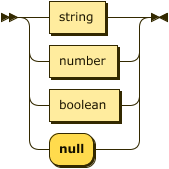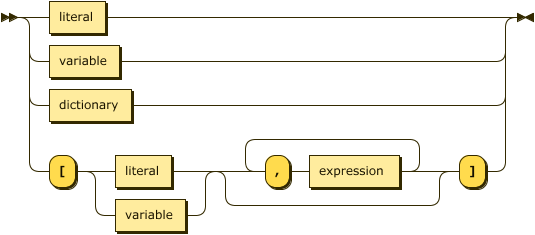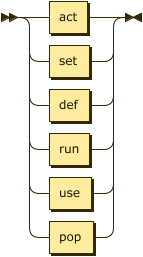Examples
This section is informative.
This section details DMPL conforming example programs.
The following sends "hello world" to the action realizer.
{
"@act": "`hello world`"
}
Two actions can be sent sequentially.
{
"@do": [
{"@act": "`hello`"},
{"@act": "`world`"}
]
}
Fork statements allow branching logic.
{
"@fork": [
{"if": ["==", ["+", 2, 2], 4], "@act": "`this statement is run`"},
{"@act": "`never reached`"}
]
}
Variables can be set and accessed like so.
{
"@do": [
{"@set": "`a`", "val": 1},
{"@set": "`b`", "val": 2},
{"@set": "`c`", "val": ["+", "a", "b"]}
]
}
Here we define a new expression called inc which takes an argument called x.
{
"@do": [
{"@def": ["", "`inc`", "`x`"], "val": {"@pop": ["+", 1, "x"]}},
{"@act", ["`inc`", 5]}
]
}
The set statement allows unpacking a list.
{
"@do": [
{"@set": "`content`", "val": ["", "`What's the biggest planet?`", "`Jupiter`"]},
{"@set": ["", "`Prompt`", "`Correct-Answer`"], "val": "`content`"}
]
}
Run an external file and pass in arguments. The return value can be considered in the following fork statement.
{"@do":
{"@run": "`Question`", "args": ["", "`What's the biggest planet?`", "`Jupiter`"]},
{"await": ["return"], "@fork": [
{"if": ["return", true], "@set": "`score`", "val": 100},
{"@set": "`score`", "val": 0}
]}
}
Expressions and variables may be imported from other files.
{
"@do": [
{"@use": "`MathExpressions`", "import": ["", "`square`", "`exp`"]},
{"@act": ["==", ["`square`", 6], ["`exp`", 6, 2]]}
]
}
To halt until a user input is supplied, the await flag on a fork may be used.
More immersive dialogue can be achieved by setting and checking variables, such as greeted.
{
"scheme": {"depth": 2}, "@fork": [
{"if": ["!", ["exists", "`greeted`"]], "@set": "`greeted`", "val": false},
{"if": ["!", "greeted"], "@do": [
{"@act": "`hello`"},
{"@set": "`greeted`", "val": true}
]},
{"if": "greeted", "@do": [
{"@act": "`how are you?`"},
{"@set": "`asked_feelings`", "val": true},
{"await": ["input"], "@fork": [
{"if": ["input", "`good`"], "@act": "`great`"}
]}
]}
]
}
More complete question and answering scenarios may be constructed.
{
"@fork": [
{"if": ["!", ["exists", "`Init`"]], "@do": [
{"@set": "`Init`", "val": true},
{"@set": "`Wrong-Counter`", "val": 0},
{"@set": "`Is-Hint1-Given`", "val": false},
{"@set": "`Is-Hint2-Given`", "val": false},
{"@set": "`Is-Answer-Given`", "val": false},
{"@set": "`Num-Hints-Given`", "val": 0},
{"@set": "`Question`", "val": "`What's the biggest planet?`"},
{"@set": "`CA`", "val": "`planet.jupiter`"},
{"@set": "`CA-Response`", "val": "`Exactly!`"},
{"@set": "`WA1`", "val": "`planet`"},
{"@set": "`WA1-Response`", "val": "`Nope. That's not the biggest`"},
{"@set": "`WA2`", "val": "`nonplanet`"},
{"@set": "`WA2-Response`", "val": "`That's not a planet`"},
{"@set": "`Hint1`", "val": "`It has a big red spot`"},
{"@set": "`Hint2`", "val": "`It's name begins with the letter J`"},
{"@set": "`Answer`", "val": "`The biggest planet is Jupiter`"},
{"@set": "`Hint-Announcement`", "val": "`Here's a hint`"}
]},
{"@fork": [
{"if": ["&&", ["<=", "Wrong-Counter", 3], ["!", "Is-Answer-Given"]], "@do": [
{"@act": "Question"},
{"@fork": [
{"if": ["input", "CA"], "@do": [
{"@act": "CA-Response"},
{"@set": "`Is-Answer-Given`", "val": true}
]},
{"if": ["input", "WA1"], "@do": [
{"@act": "WA1-Response"},
{"@set": "`Wrong-Counter`", "val": ["+", 1, "Wrong-Counter"]}
]},
{"if": ["input", "WA2"], "@do": [
{"@act": "WA2-Response"},
{"@set": "`Wrong-Counter`", "val": ["+", 1, "Wrong-Counter"]}
]},
{"@do": [
{"@set": "`Wrong-Counter`", "val": ["+", 1, "Wrong-Counter"]}
]}
], "await": ["input"]}
]},
{"if": ["&&", ["!", "Is-Hint1-Given"], ["==", "Wrong-Counter", 1]], "@do": [
{"@act": "Hint-Announcement"},
{"@act": "Hint1"},
{"@set": "`Is-Hint1-Given`", "val": true}
]},
{"if": ["&&", ["!", "Is-Hint2-Given"], ["==", "Wrong-Counter", 2]], "@do": [
{"@act": "Hint-Announcement"},
{"@act": "Hint2"},
{"@set": "`Is-Hint2-Given`", "val": true}
]},
{"if": ["&&", ["!", "Is-Answer-Given"], ["==", "Wrong-Counter", 3]], "@do": [
{"@act": "Answer"},
{"@set": "`Is-Answer-Given`", "val": true}
]}
], "scheme": {"depth": 3}}
]
}
Here's how to handle global interruptions from the user.
{"scheme": {depth: 1}, "@fork": [
{"@do": [
{"@act": "`What's your favorite color?`"},
{"await": ["input"], "@fork": [
{"if": ["input", "`red`"], "@act": "`That's my favorite color, too!`"}
{"@act": "`I've never heard of it`"}
]}
]},
{"if": ["input", "`want to quit`"], "@act": "bye"}
]}
Related Technologies
This section is informative.
Artificial Intelligence Modelling Language (AIML)
AIML tightly couples dialogue logic with natural language processing (NLP).
As a result, authoring complicated dialogue systems in AIML requires authors to create an extensive knowledge-base,
requiring a large number of rules that need to be crafted in order to imitate a natural conversation.
This often requires domain expertise in order to capture the intricate nuances associated with open-ended dialogue.
DMPL, on the other hand, is a general representation for dialogue flow and control without text pattern matching rules.
ChatScript
ChatScript incorporates stronger pattern matching than AIML by using NLU to find the best topic
match instead of the best pattern match for an input.
To incorporate NLU, ChatScript packages a large database of concepts, which are sets of synonyms.
Defining custom concepts is easily accomplished, but requires careful design in order to avoid
being matched with already existing concepts, and to avoid having disjoint inputs being matched with the same concept.
DMPL modularizes the NLU, relieving content-writers from having to write complex pattern matching expressions.
RiveScript
RiveScript mainly concerns itself with fetching a user's input message, and leaving everything else to the content writer.
It's designed to extend and simplify AIML but still has the overhead of having to write complex
pattern matching expressions limiting the variability and scope of the dialogue that can be produced.
DMPL decouples the need to write complicated pattern matching rules, and instead uses utility functions
to both drive dialogue and respond to the user's input accordingly.
Planning Domain Definition Language (PDDL)
One of the first languages, Planning Domain Definition Language (PDDL) represents tasks by two files:
a domain file, which lists available actions, and a corresponding problem file,
which defines the initial fluents and goal specifications.
Each action defined in the domain file has an entry-condition and a deterministic effect.
Deterministic planning is a major limitation, since we’re modeling tasks in interactive or unpredictable environments.
PDDL v3.1 (the latest version as of April 2019) incurs the following limitations:
- The definition of a goal in PDDL is restricted to first-order predicate logic. DMPL instead
defines fluents by pair-wise preferences.
-
PDDL addresses conformant planning, whereas DMPL addresses contingent planning
(Reference).
Probabilistic PDDL (PPDDL)
Probabilistic PDDL (PPDDL) addresses PDDL's limitation by introducing stochastic effects,
so that planning may account for probabilistic outcomes of each action.
The PPDDL inference engine can solve for an action sequence that optimizes a user-defined utility function.
Through some careful organization and design of the domain file, it is also possible, but not intuitive,
to support hierarchical planning within PPDDL.
On the other hand, DMPL is designed with hierarchical planning from the get-go, by pushing fluents to a stack once entering a new subroutine.
Probabilistic Programming
Unlike PPDDL, WebPPL and Stan are general purpose probabilistic programming languages that offer a rich selection of
statistical models and efficient MCMC sampling.
These languages are used to specify general statistical models, which can model an autonomous agent in a stochastic environment.
Since they’re general purpose, like DMPL, WebPPL and Stan support user-defined functions and external interfaces to user-defined business logic.
Decision Theoretic Languages
Languages designed specifically for decision problems include IBAL and Markov logic decision networks (MLDN),
which come with approximate inference solvers.
DTProbLog introduces exact solvers to compute the optimal strategy in a decision-theoretic probabilistic language,
using Algebraic Decision Diagrams (ADD).
However, DTProbLog is less concerned with sequential decision problems.
These languages leverage the Markov Decision Process (MDP) framework, which requires a definition of immediate reward of transitioning from one state to another.
Strategically, DMPL disallows users from defining MDP-like rewards and limits the utility function to be defined indirectly through listing pairs of preferred situations.
Doing so alleviates the guess-work from the user, and reduces buggy code (most common being infinite-loops due to ill-defined rewards).
Missing from most probabilistic programming languages is the runtime of the agent.
In other words, once an action-sequence is resolved, instructions for following through with the chosen action on an agent is run elsewhere,
usually defined in a separate codebase.
DMPL borrows ideas from DTGolog, where both the planner (simulation engine) and evaluator (runtime) consult the same user-written abstract syntax tree.
The DMPL code is used both to plan by sampling possible actions and to execute by traversing the same abstract syntax tree.
























